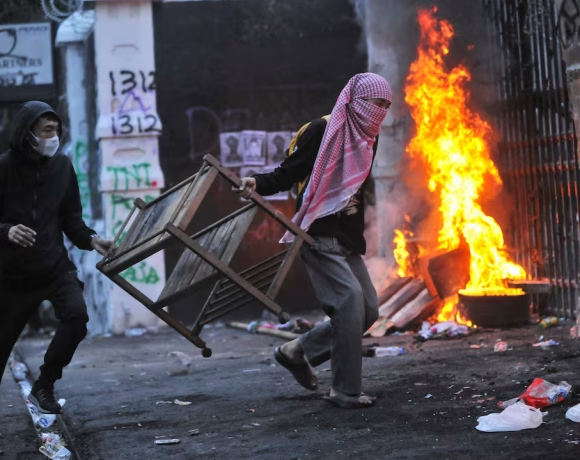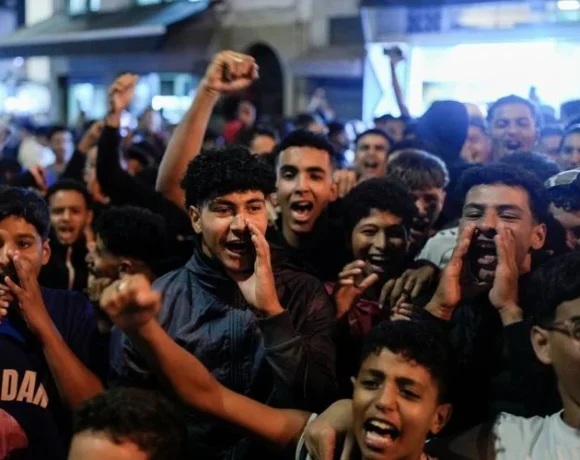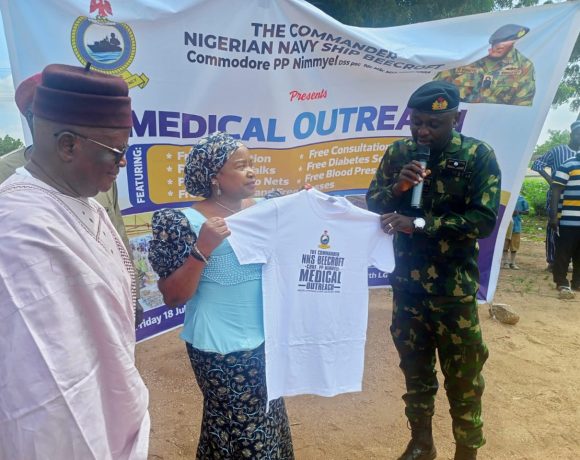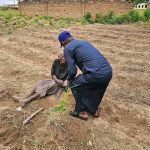Feature: Nigeria’s Tragic Misplacement of Priorities: Ranching Humans While Cattle Roam Free
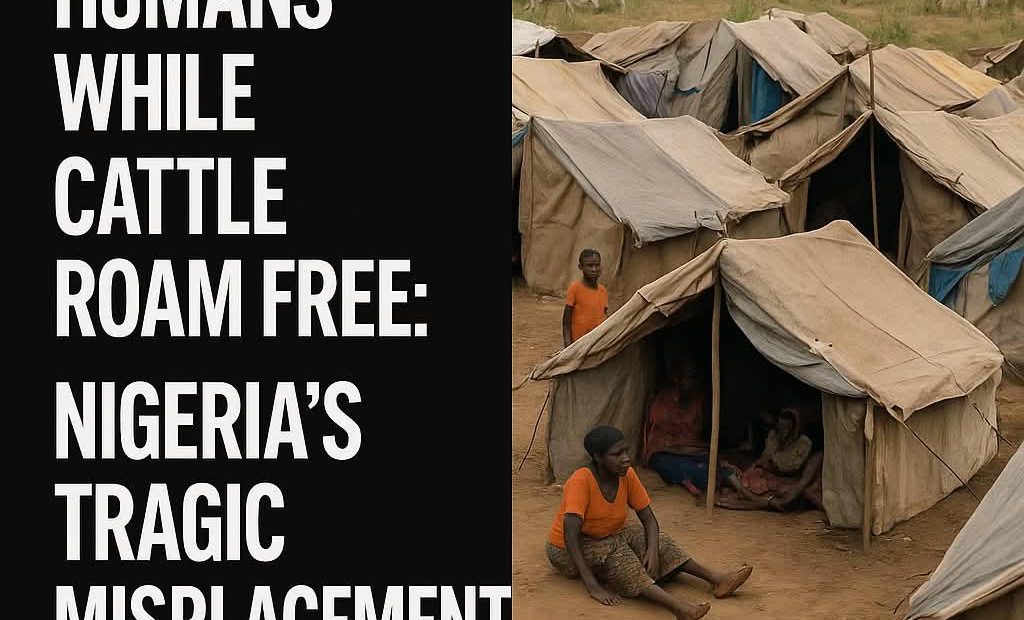
Nigeria
In the rich, fertile lands of Benue State, known as the food basket of Nigeria, a heartbreaking and deeply troubling paradox has taken root—a story of dislocation, erasure, and broken promises that has for too long been hidden from the nation’s collective conscience.
Here, thousands of Nigerians have been forcefully uprooted from their ancestral homes by waves of violence, largely instigated by armed herders. These victims—men, women, and children—do not live freely on their lands; instead, they find themselves confined in overcrowded and under-resourced Internally Displaced Persons (IDP) camps within Benue State, including in Makurdi, Guma, Ukum, Logo Kwande, Gwer West, Gwer least, Agatu, Otukpo Local government areas. Meanwhile, the cattle responsible for their displacement roam the countryside freely, often in open defiance of laws meant to curb such grazing.
In Benue today, it appears humans are effectively being ranched, while livestock enjoy unfettered liberty.
This reversal of natural and moral order is not only tragic—it is a stain on Nigeria’s promise of justice, dignity, and the right to security for all its citizens. The stories emerging from these camps give voice to a humanity trapped in limbo—caught between fear and hope, displacement and the yearning for home.
Consider Dooshima, a mother of four residing in an IDP camp in Daudu, Guma Local Government Area. She has been displaced for years, separated from the fertile ancestral lands her family once tilled. The cramped tents, inadequate sanitation, and scarcity of basic needs erode her family’s dignity day by day. Like many others, Dooshima dreams of returning to cultivate the lands that were stolen from her people, but the persistent violence and lack of effective government protection keep her confined to this reluctant exile within her own country.
Dooshima’s story echoes that of tens of thousands in camps scattered across Benue and its environs. For many displaced families, loss of land represents cultural and emotional fragmentation more than a mere physical displacement. These farmlands are not just soil to plant crops; they are the bedrock of identity, history, and survival. Yet, while displaced people endure confinement, vast stretches of farmland lie fallow as cattle graze freely—often accompanied by armed herders who openly flout Benue’s anti-open grazing laws.
This gross failure to enforce laws designed to protect farmers reveals a broader retreat from the rule of law, favoring chaos under the guise of convenience and political expediency. Livestock, a cornerstone of some livelihoods, have become instruments of displacement rather than economic assets to be sustainably managed. By allowing cattle to overrun farmlands and denying farmers their rightful claim, the state effectively places the interests of cattle above those of its citizens.
The ripple effects extend far beyond individual tragedies. Benue, once a thriving agricultural hub producing grains, yams, vegetables, and staples vital to Nigeria’s food security, now teeters on the brink of economic collapse. The disruption of farming cycles, abandonment of fields, and unending insecurity have transformed abundance into scarcity, fueling hunger, poverty, and regional instability.
In the midst of this human catastrophe, the Mutual Union of the Tiv in America (MUTA), representing Tiv communities in the United States and Canada, has emerged as a critical advocate for the displaced. MUTA has persistently amplified the voices of millions trapped in IDP camps within Benue and surrounding states. Through engagement with international partners—including foreign governments and humanitarian organizations—MUTA has worked tirelessly to spotlight the crisis, demanding urgent government action to ensure the safe and dignified return of displaced communities.
At rallies within camps and public forums, MUTA leaders have called forcefully for accountability and strict enforcement of Benue’s anti-open grazing laws to protect Tiv farmlands. Chief Iorbee Ihagh, President General of Mzough U Tiv worldwide, alongside MUTA representatives, has condemned the political neglect that allows cattle and their armed herders to roam free while people remain confined to camps. Their advocacy encompasses petitions to Nigeria’s National Assembly, appeals to U.S. lawmakers, and meaningful humanitarian support—including the provision of food and relief materials to IDPs. MUTA continuously urges all stakeholders to recognize and restore the dignity and livelihoods of displaced farmers.
This diaspora-led advocacy deepens the collective call for justice and underscores the moral failure within governance that privileges cattle mobility over human security. MUTA’s engagement crystallizes the urgent need for solidarity, both nationally and internationally, to respond to a crisis that is profoundly local yet reverberates far beyond.
The unfolding tragedy is emblematic of a greater moral and political failure. Government agencies mandated to protect citizens and enforce laws have been mostly reactive, displaying a disturbing lack of political will to safeguard farming communities or prosecute perpetrators of violence. Meanwhile, international humanitarian organizations, stretched thin by multiple emergencies, largely focus on meeting immediate needs rather than fostering long-term solutions for resettlement and healing.
The image of “ranching humans while cattle roam free” transcends metaphor—it indicts a policy framework and value system twisted against human dignity and survival. When people are penned into camps like livestock, deprived of freedom and means to live, while animals roam unaccountable, the very foundation of justice and governance is eroded.
Rectifying this grave injustice demands urgent, decisive, and inclusive action. First, Benue’s anti-open grazing law must be enforced transparently and absolutely, without political interference or exemptions. Protecting farmlands is non-negotiable; farmers must be guaranteed the right and security to return and cultivate their lands. Second, a comprehensive and well-resourced plan is needed to facilitate the safe and dignified return of millions displaced by violence. This includes security guarantees, infrastructure rehabilitation, healthcare, education, and psychosocial support for victims of trauma. Third, all perpetrators—herders, bandits, or others—must be identified and held accountable through impartial and transparent legal processes. Ending impunity is essential to rebuilding trust in government.
Community dialogue and reconciliation are also critical components to bridging divides and fostering coexistence between pastoralists and farmers. Sustainable land management, improved livestock practices such as organized ranching, and balanced policies that account for ecological, economic, and social stakes are required to foster peace and prosperity.
Failure to act comprehensively risks deepening fractures within Nigeria’s social fabric—exacerbating ethnic, economic, and occupational tensions. Agricultural decline threatens the livelihoods of millions and jeopardizes national food security and economic stability. The haunting image of people “ranched” in camps will stand as a potent symbol of a state that chose convenience and impunity over justice and dignity.
Benue’s plight exposes the tragic consequences of misplaced priorities—where cattle, symbolic of wealth and sustenance, become instruments of dispossession, and where the human rights of citizens are treated as expendable. It calls for a profound national reckoning: to reaffirm that in Nigeria, it is people who are the true custodians of the land, deserving of safety, dignity, and a future free from fear.
“Ranching humans while cattle roam free” is far more than a policy failure—it is a profound moral and ethical crisis. For Nigeria to heal and thrive, it must urgently reclaim its founding principle that human life and dignity come before all else. The voices of Dooshima and thousands like her are not mere statistics—they are living testimonies of resilience, courage, and hope.
The future of Benue, and indeed Nigeria, depends on a simple, powerful truth: the land belongs to its people first—and when they are free to live, work, and dream upon it, the nation will stand stronger, more just, and more united.



